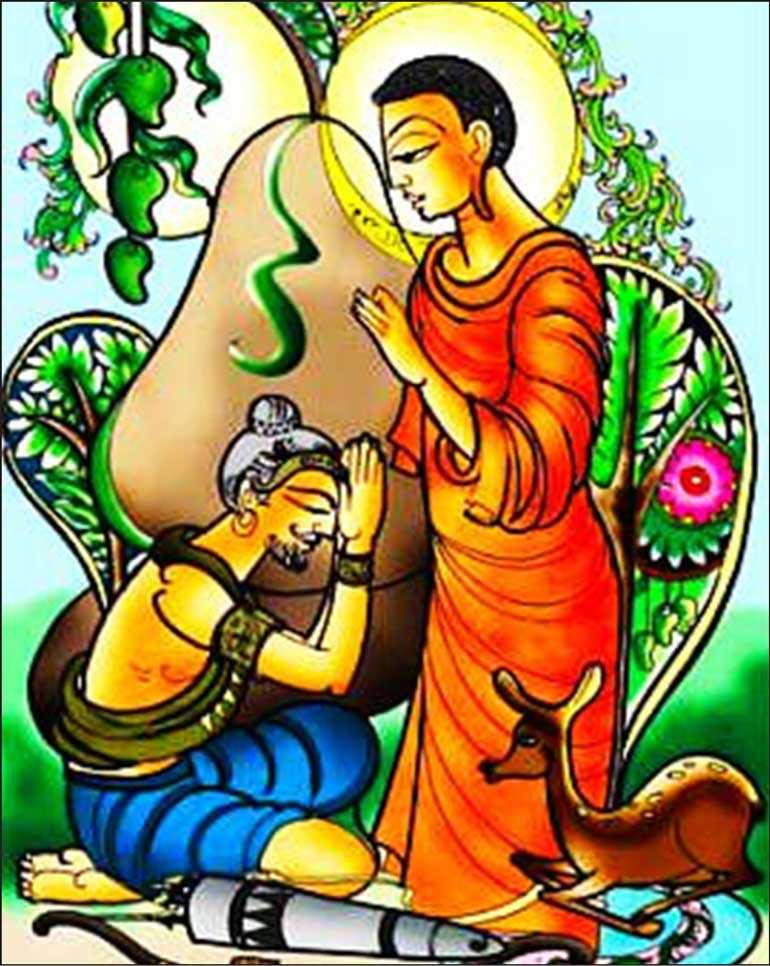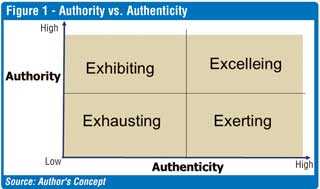Wednesday Feb 18, 2026
Wednesday Feb 18, 2026
Thursday, 4 June 2020 00:20 - - {{hitsCtrl.values.hits}}

We are to witness a serene Poson Poya with homebound rituals due to COVID-19. Whilst Sri Lankan life is slowly returning to normal, despite a few active COVID-19 clusters, political fronts seem to embrace in election campaigns. 
Instead of vision and wisdom, what we often see is vengeance and weirdness with petty rivalries. Do we really see a set of aspiring ‘statesmen’ and ‘stateswomen’ awaiting to enter the echelons of national service? Do they show us their authentic intention to serve the deserving masses rather than worrying about the future of their kith and kin? Poson is an opportune time to reflect on such realties, in the broad context of leadership.
Overview
Poson Poya is associated with the arrival of Buddhism in Sri Lanka. It is widely hailed as the beginning of a new era in Sri Lankan civilisation. It commemorates the occasion of Arahat Mahinda, son of Emperor Asoka of India, arriving here. The way he converted King Devanampiyatissa to Buddhism is an amazing story to depict the subtle difference between an ‘owner’ and a ‘servant’.
When referring to the dialogue that took place between the King Devanampiyatissa and Arahat Mahinda, a logical testing of the intelligence of the king can be seen.
“…And are there, besides other mango trees and those trees which are not mango trees, yet other trees?”
“There is this mango tree, Sir.”
With that insightful answer, Arahat Mahinda has apparently appreciated the king’s wisdom in advising him, as a ruler to act as more as a servant of the land than the owner of it.
“O King, mighty as you are, it is well to remember that total ownership of the environment is not yours. You are but the trustee of the mountains, the rivers, the forests and the oceans which enrich our lives, and it is your bounden duty to hand these down to posterity in the condition in which you inherited them from your forefathers.”
Do we see such a mindset among the modern-day managers and administrators, particularly in the governing circles? Much soul-searching is required in the spirit of Poson towards the search of not only being authoritative but authentic.
Power and authority
In typical management context, the term ‘power’ refers to a capacity that one person has to influence the behaviour of another, so that the second acts in accordance with the first’s wishes. It is more a capacity or potential as it may exist but not be used. Probably the most important aspect of power is that it is a function of dependence.
Let’s take two persons, A and B. The greater B’s dependence on A, the greater is A’s power in the relationship. Dependence, in turn, is based on alternatives that B perceives and the importance that B places on the alternative(s) that A controls.
Authority is the legitimate power. The typical dictionary defines it as the institutionalised and legal power inherent in a particular job, function, or position that is meant to enable its holder to successfully carry out his or her responsibilities. It also refers to the power that is delegated formally. It includes a right to command a situation, commit resources, give orders and expect them to be obeyed, it is always accompanied by an equal responsibility for one’s actions or a failure to act.
King Devanampiyatissa had the authority vested in his rulership being the head of the state. The advice of Arahat Mahinda was to use that authority with better meaning and broader understanding. When the authority vested in the key public sector positions is not properly used to prevent corruption or to promote commitment, it in fact becomes authority wasted. Giving excuses in highlighting limitations whilst pointing fingers at one another, which was a prevalent political phenomenon, signified the same sad scene.
Authority vs. authenticity
As we already saw, authority is legitimate power. What about authenticity? It is simply being genuine in one’s all words and deeds. There is a degree of principle-centred behaviour implied here. You show your real values in action by being authentic or otherwise. We have plenty of live examples on the political front these days.
How can authority and authenticity meaningfully be related? We can see four possible options. Figure 1 illustrates it in detail. Based on figure 1, we can describe the four possible scenarios as follows:
Exhausting
A clear struggle with both aspects being low is meant here. It directly points to poor attitude and aptitude. Sad to see some prominent political figures through their utterances reveal their lack of authenticity in ‘wasting the authority vested’. 
This is the cluster of people who are very loud in criticising the slightest when in the Opposition, and whilst in power, very lame and blaming others for their inability to perform the assigned tasks, or to achieve the given targets. It is always a case of passing the buck with lamenting instead of leading. We saw many such nonsensical utterances criticising the local approach towards tackling COVID-19.
Exhibiting
This is the common tribe we see in the political circles. Showing society a virtuous outlook while being vicious in misusing the vested authority. No political party can absolve itself from this. Gross abuse of power we heard in multiple instances can be summed up in this category. Again, the authority vested is wasted.
Social media is full of revelations of such virtues and vices involving many popular figures who blatantly say they did not say something, where the original video footage is still available. Insomnia in forgetting the past, or selectively recalling only the favourable past, are signs of such behaviours.
Exerting
Another interesting category is ‘people representatives’ who attempt to do a genuine job but lack the required authority. The bountiful backbenchers who occasionally complain about missing the needed authority. One positive aspect is the decency some of them demonstrate in having patience despite being overlooked for deserving positions.
This category is perhaps the hard-working servants who are not being invited for celebrations. Tapping their energy and enthusiasm can pave way for better results. They do not have vested authority to waste. We see many such unsung heroes in the society who go unappreciated. Humanitarian assistance from silent Samaritans during the COVID-19 lockdown period is a case in point.
Excelling
This is the ideal place to be where you have the much-needed authority whilst showing the expected genuineness to the fullest. King Devanampiyatissa demonstrated this in his meaningful dialogue with Arahat Mahinda. We had this rare breed in the political circles in the past. We see the religious leaders of the calibre of His Eminence Malcolm Cardinal Ranjith aptly demonstrating the appropriate blend of authority and authenticity in his words and deeds in the aftermath of the Easter Sunday tragedy last year. Many committed professionals, civil and military alike demonstrate this rare calibre in the current COVID-19 battle.
It reminds me what was shared with me by my friend Mano about William Gopallawa, the first Buddhist Governor-General and first non-executive President of Ceylon/Sri Lanka, relating to an incident where he was insulted by a golf caddy in Nuwara Eliya: “The grace of power is not using it but knowing when not to use it.” That is the sure way to ensure that the authority vested is not wasted.
Serving to the forefront
Excelling in the above sense has a clear connection to serving others. Chanakya, the famous author of the ‘Arthashastra’ wrote, in the 4th century BC as follows:
“The king (leader) shall consider as good not what pleases himself but what pleases his subjects (followers)”; “the king (leader) is a paid servant and enjoys the resources of the state together with the people”.
There are passages that highlight the servant dimension of leadership, attributed to Lao-Tzu, who is believed to have lived in China sometime between 570 B.C. and 490 B.C.
“The highest type of ruler is one of whose existence the people are barely aware. Next comes one whom they love and praise. Next comes one whom they fear. Next comes one whom they despise and defy. When you are lacking in faith, others will be unfaithful to you. The sage is self-effacing and scanty of words. When his task is accomplished and things have been completed, all the people say, ‘we ourselves have achieved it!’”
The fascinating point here is that the servant leader appears as a “leader breeder” in developing his/her followers to serve others.
Robert Greenleaf is famous for featuring the facets of servant leaders. Let’s look at how he describes the concept further:
“The servant-leader is servant first. Becoming a servant-leader begins with the natural feeling that one wants to serve, to serve first. Then conscious choice brings one to aspire to lead. That person is sharply different from one who is leader first. The difference manifests itself in the care taken by the servant first to make sure that other people’s highest priority needs are being served. The best test, and the most difficult to administer, is this: Do those served grow as persons? Do they, while being served, become healthier, wiser, freer, more autonomous, more likely themselves to become servants?”
Sri Lanka is in dire need for such leaders in all fronts. Progress made so far in tackling COVID19 pandemic highlights the salient presence of some, in critical positions.
Way forward
In coinciding with the Poson pondering, there is an interesting thought from John Wesley: “Do all the good you can. By all the means you can. In all the ways you can. In all the places you can. At all the times you can. To all the people you can. As long as ever you can.”
COVID-19 has taught us the timely relevance of such a course of action. If we diligently do so, the authority vested will surely not be wasted.
(Prof. Ajantha Dharmasiri can be reached through [email protected], [email protected] or www.ajanthadharmasiri.info.)